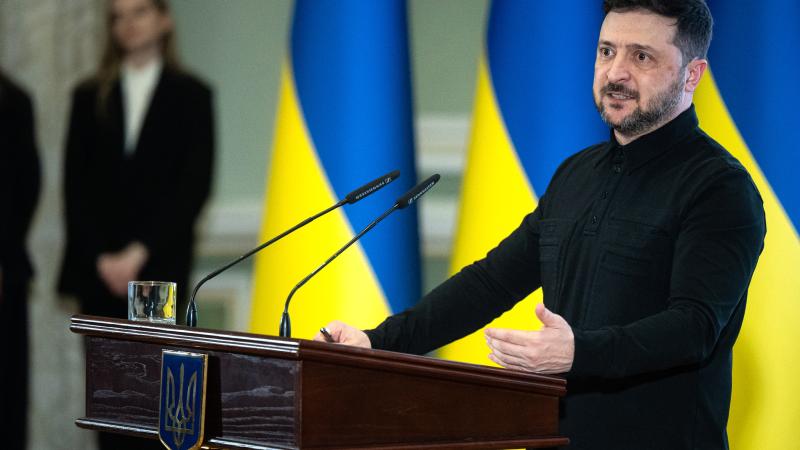While media focuses on Project 2025, concerns grow over UN's 2030 Agenda, 'Transforming our world'
Far from being a call for international cooperation, the initiatives appear to represent a global power grab.
While many American journalists and Democrats remain obsessed with Project 2025, the conservative blueprint for a Republican White House, world leaders including Democratic President Joe Biden are now increasingly focused on Project 2030, the United Nation program officially known as "Transforming our world: the 2030 Agenda for Sustainable Development."
Leading this movement, as initially reported by the writer Tim Hinchcliffe, is UN Secretary-General António Guterres, who has called for a sweeping overhaul of the United Nations Security Council and the global financial system.
The initiative, presented under the pretense of accelerating Agenda 2030’s Sustainable Development Goals, is being marketed as a noble effort to combat poverty, inequality, and climate change. Yet, beneath the rhetoric lies perhaps a more concerning agenda that could compromise national sovereignty and individual freedoms under the guise of global progress.
At the core of this year's UN General Assembly meeting, Sept. 22-23 in New York, is the "Pact for the Future," which is being promoted as a bold vision for addressing the pressing challenges of the 21st century.
However, this is not just another international accord. The pact represents a blueprint for consolidating power under a global governance structure that leaves little room for dissent or alternative perspectives. It comprises 11 policy proposals, including the creation of a UN “Global Digital Compact,” as well as initiatives focusing on “Youth Engagement, “Outer Space,” and the management of various information channels.
Each of the proposals could fundamentally alter governance structures and redefine freedom, particularly in the digital age.
Perhaps one of the most troubling aspects of the pact is the proposed “Emergency Platform.”
The platform if enacted would give the UN secretary-general the authority to declare and manage global emergencies, effectively granting one individual sweeping powers over the international community during any future crisis – real or perceived.
In addition, Guterres has raised alarms about the risks posed by emerging technologies, particularly artificial intelligence. He emphasized the urgent need for a global consensus on how to manage such technology, particularly in relation to their potential militarization.
He has also urged governments to collaborate with tech companies, academic institutions, and civil society to ensure that advancements in AI are used for the benefit of all humanity, rather than being concentrated in the hands of a powerful few.
The discussions about the pact will take place at next week's summit, which is being promoted as a high-level gathering aimed at forging a new global consensus.
However, it could be argued that this summit is not primarily about protecting freedom or promoting human well-being. Rather, it is part of a larger initiative called “Our Common Agenda,” which seeks to consolidate centralized global authority under the pretext of collaboration and security.
The vision, which echoes the dystopian promise of a future in which individuals "own nothing and are happy," appears like a manifestation of the Great Reset in action.
The "Global Digital Compact” outlines principles for creating a "human-centered" digital future that supposedly respects universal human rights while promoting the Sustainable Development Goals. However, beneath the lofty language lies a framework that could significantly undermine personal freedoms.
The compact includes recommendations for the implementation of digital identification systems, so-called "digital public goods," and "digital product passports," all under the guise of creating a safer and more accountable digital environment.
Additionally, it advocates for measures to combat "disinformation" and the misuse of online platforms. The potential danger of such proposals lies not in their stated goals, but in the unchecked power they could grant governments and global organizations to control information and monitor citizens.
Another aspect of the compact generating concern is its proposed digital identification system, which could enable governments to easily track, censor and silence dissenting voices. Additionally, the U.N.'s plans to combat disinformation and hateful speech raise pressing concerns.
In these deeply polarized times, who decides what defines truth? The policy brief "Information Integrity on Digital Platforms" advocates for an empirically supported consensus on facts, science, and knowledge. Yet, it remains unclear how this consensus will be established—or who will have a say in shaping it.
The compact also pushes for advanced vaccine technologies and large-scale vaccine production, apeparing to lay the groundwork for global vaccine passports. The measures could ultimately override individual rights to refuse medical interventions, moving beyond public health concerns and inching towards a system of surveillance where personal autonomy is compromised in favor of global governance.
Far from being a call for international cooperation, the initiatives appear to represent a global power grab.
The proposed digital frameworks would grant unprecedented control to international bodies and private corporations, dictating the flow of information, monitoring individual behavior, and imposing restrictions under the pretext of serving the public good.
















